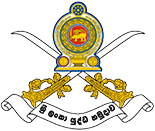The second day’s itinerary of the visiting Chinese State Councilor and Minister of National Defence General Liang Guanglie with his delegation of 23 senior military officers, began with a visit to the Defence Services Command and Staff College (DSCSC) at Sapugaskanda on Thursday (30) morning.
General Guanglie makes history, by being the first Chinese Defence Minister to visit Sri Lanka at the invitation of Ministry of Defence and Urban Development.
General Liang Guanglie and his delegation on arrival at Sapugaskanda DSCSC was received by Chief of Defence Staff (CDS), Air Chief Marshal Roshan Goonetillake in the company of Major General J.C Rambukpotha, Commandant, DSCSC.
Commander of the Army, Lieutenant General Jagath Jayasuriya, Commander of the Navy, Vice Admiral D.W.A.S. Dissanayake and Commander of the Air Force, Air Marshal H.D Abeywickrama were in attendance during the entire visit on Thursday (30).
Addressing tri-service student military officers under training at DSCSC on the topic ‘China's Peaceful Development and Its National Defence Policy’, the visiting Chinese military leader told the gathering that China attaches great importance to its relations with the South Asian nations, and commits itself to forging harmonious co-existence and mutually beneficial and win-win cooperation with them.
‘Among China's 14 land neighbours, 5 are in South Asia. The Indian Ocean is an important energy and material transportation route for China. The People’s Liberation Army's efforts in conducting friendly exchanges and cooperation with its counterparts in the South Asian nations are intended for maintaining regional security and stability and not targeted at any third party. China’s adherence to a peaceful development path determines that China will pursue a national defence policy that is defensive in nature. It is to curb separation, promote reunification, guard against and resist aggression, protect state sovereignty, territorial integrity and maritime rights and interests, and safeguard national development interests. This is a sacred duty of China's national defence, enshrined in the Constitution, and also an objective requirement for the survival and development of the nation’, General Guanglie said.
‘China and Sri Lanka enjoy a time-honored friendship. In ancient China, Sri Lanka was known as "the Lion Kingdom". It is a brilliant pearl on the Indian Ocean, a sacred place where many famous monks traveled for Buddhist scriptures, and an important hub on the Maritime Silk Road. It has played an important role in promoting China's trade and cultural exchanges with South Asia and other neighboring countries.’
‘Sri Lanka is also one of the first countries to recognize the People's Republic of China. Since the establishment of bilateral diplomatic relations, China-Sri Lanka friendship has withstood the test of international vicissitude and we have always maintained good cooperation. This year marks the 55 anniversary of our diplomatic ties. We are ready to take this opportunity to further advance the All-round Cooperation Partnership of Sincere Mutual Support and Ever-lasting Friendship between us’.
A question-answer session allowed the audience to raise a few inquiries from the visiting General before his exit from the DSCSC. Exchange of mementos culminated the day’s proceedings.
The next stop for the high level delegation was the Defence Services College at Colombo 2 where thousands of War Hero children accorded him a rousing welcome after General Guanglie was warmly received at the entrance to the College.
Here follows the full text of the visiting Chinese Defence Minister’s address to DSCSC student officers Thursday (30) morning;
Good Morning! Ayubovan!
It gives me great pleasure to visit Sri Lanka and meet with all the friends here. First of all, I would like to express my heartfelt thanks to my Sri Lankan friends for you kind invitation and gracious hospitality. On behalf of the Chinese government, the Chinese people and the Chinese People's Liberation Army, I'd like to take this opportunity to extend our sincere greetings and good wishes to the Sri Lankan government, the Sri Lanka people and the Sri Lankan Armed Forces.
China and Sri Lanka enjoy a time-honored friendship. In ancient China, Sri Lanka was known as "the Lion Kingdom". It is a brilliant pearl on the Indian Ocean, a sacred place where many famous monks traveled for Buddhist scriptures, and an important hub on the Maritime Silk Road. It has played an important role in promoting China's trade and cultural exchanges with South Asia and other neighboring countries.
Sri Lanka is also one of the first countries to recognize the People's Republic of China. Since the establishment of bilateral diplomatic relations, China-Sri Lanka friendship has withstood the test of international vicissitude and we have always maintained good cooperation. This year marks the 55 anniversary of our diplomatic ties. We are ready to take this opportunity to further advance the All-round Cooperation Partnership of Sincere Mutual Support and Ever-lasting Friendship between us.
Ladies and Gentlemen, Dear Friends,
I'm deeply honored to be the first Chinese Defence Minister to visit Sri Lanka and interact with you here. I'd like to share with you some thoughts in my following speech titled China's Peaceful Development and Its National Defence Policy, which I hope would give you a better understanding about China.
We all know that since the beginning of its reform and opening-up, China's overall national strength and international influence have grown remarkably. Some people in the international community suspect that China would take the road of expansion with force, and have been actively spreading the "China Threat Theory". On this point, the Chinese government issued a whitepaper China's Peaceful Development in 2011, solemnly declaring to the world that China will unswervingly follow the path of peaceful development. The core idea of this path is that China will develop itself through upholding world peace and contribute to world peace through its own development. It is committed to building a harmonious world of durable peace and common prosperity.
First, China's adherence to the path of peaceful development is determined by its history, culture and traditions. What stays at the center of the Chinese culture and traditions is the idea of peace and harmony. In the Sri Lanka National Museum stands a stone tablet carved in 1409. It was gifted by Zhenghe, the famous navigator in ancient China during his stopover in Sri Lanka, as a commemoration for his donation to a local Buddhist temple. The three languages carved on the stone tablet, namely, Chinese, Persian and Tamil, expressed respect for Buddhism, Islam and Brahmanism. This shows the inclusiveness of the Chinese people towards different religions, and the respect for the harmonious co-existence of multiple cultures. Such a historical culture and tradition that values peace above all, has exerted profound influence on China's choice of a peaceful development path.
Second, China's adherence to the path of peaceful development is a choice necessitated by its national conditions. Modern China was plagued by invasions and wars brought to us by foreign powers. The Chinese people know the value of peace and the importance of accelerated development. Since the establish of the People's Republic of China, especially in the past 3 decades or more, great achievements have been made in the development of various fields. However, a large population, a weak economic basis, and unbalanced development are still the basic national conditions of China. As a developing country, China's central task will always be promoting economic and social development, and improving people's living standard. Therefore, we will walk straight along the path of peaceful development from generation to generation.
Third, China's adherence to the path of peaceful development conforms with the trend of peaceful development in the world today. In our times, world-multipolarity, economic globalization and social informationalization are gaining momentum. Countries are becoming increasingly interdependent and more closely linked with each other in terms of interests. Under such circumstances, the pursuit for peace, development and cooperation has become an irresistible trend of the times. It is now a common aspiration of people in different countries to work together to make good use of development opportunities and cope with various risks. The Communist Party of China, the Chinese government and people have all realized that China's development must conform with the trend of history, must stick to peaceful development and common development and prosperity with the rest of the world. It should never take the old path of seeking hegemony, as a repeat of the old pattern that countries are bound to seek hegemony when they become strong.
Among China's 14 land neighbors, 5 are in South Asia. The Indian Ocean is an important energy and material transportation route for China. China attaches great importance to its relations with the South Asian nations, and commits itself to forging harmonious co-existence and mutually beneficial and win-win cooperation with them. The PLA's efforts in conducting friendly exchanges and cooperation with its counterparts in the South Asian nations are intended for maintaining regional security and stability and not targeted at any third party.
Ladies and Gentlemen, Dear Friends,
National Defence Policy is subject to and in service of national development strategy and security strategy. China's adherence to a peaceful development path determines that China will pursue a national defence policy that is defensive in nature. The basic concept of this policy includes:
First, the fundamental goals and tasks of China's national defence is to curb separation, promote reunification, guard against and resist aggression, protect state sovereignty, territorial integrity and maritime rights and interests, and safeguard national development interests. This is a sacred duty of China's national defence enshrined in the Constitution, and also an objective requirement for the survival and development of the nation.
Second, China pursues a coordinated development of its national defence and economy. China's national defence development is always to meet the legitimate needs of its own security by strengthening national defence on the basis of economic development. In recent years, some foreign media intentionally played up the topic of China's defence expenditure, accusing that China’s defence expenditure has been increased too fast. Here I'd like to tell everyone frankly that China's defence spending in 2010 and 2011 took 1.4% and 1.28% of its GDP respectively. Compared with the developed countries and some developing countries, China's defence spending stays at a very low level. Some people claimed China's, legitimate efforts in national defence as a "military threat". Among these people, some may have made the judgment due to lack of understanding, and some others did it out of Cold War mentality, which is a distorted understanding on China's national defence polity.
Third, China exercises a military strategy of active defence. The basic principle of the strategy is the adherence to a self-defence position that not to take the initiative to offend others, stand for non-military means to solve disputes, take defensive posture strategically, conduct self-defence and attack only after being attacked. Take the recent Huangyan Island incident as an example, it is obvious that China's military strength is stronger than that of the Philippines, but we didn't use force or threat to use force, on the contrary, we have been committed to seeking solution of the dispute through diplomatic means. China adheres to a nuclear strategy of self-defence, and always follows the policy of no first use of nuclear weapons any time under any circumstances. We haven't, and will not engage in nuclear arms race with any country.
Fourth, China sticks to improving the quality of its military with informationalization as the main objective. At present, international military competition is becoming increasingly intense, and Revolution in Military Affairs worldwide has entered a new stage of development. Following this trend, we have been actively advancing the RMA with Chinese characteristics, and trying to improve defence capability of the military under informationalized conditions.
Fifth, China firmly upholds world peace and stability. Up to now, China has dispatched around 21,000 person/times to 30 UN Peace-keeping missions, making it the largest personnel contributor among the 5 permanent members of the UN Security Council. We have sent rescue teams for 18 times to conduct humanitarian rescue operations in the disaster-hit regions of the Indian Ocean tsunami, the earthquakes in Pakistan and Yogyakarta, Indonesia, and the cyclone in Myanmar. Since 2008, China has sent 12 batches of naval task forces to conduct escort missions in the Gulf of Aden and off the coast of Somalia. We have provided escort service for 4750 Chinese and foreign ships. With the further modernization of China's national defense, China will make greater contributions to world peace as a responsible member of the international community.
Ladies and Gentlemen, Dear Friends,
In December 2009, a Sri Lankan brigade commander whd was studying in the PLA Army Command College in Nanjing volunteered for a blood donation. He said: Donating a drop of blood is an obligation of a patriotic soldier. During the last 24 years, I sacrificed my blood and sweat at the battlefield to safeguard the sovereignty of my native land. China had been an inseparable companion in our victorious march towards the elimination of terrorism. Today I am delighted as I leave my blood in China, my heart and my blood are forever with the Chinese people. The sincere words of this brigade commander demonstrated the precious friendship between our two peoples, the friendship of standing together in difficult times, the friendship of feeling connected deep in our hearts. We'll always remember that.
Today, we are glad to see that under the leadership of the Sri Lankan government, the diligent, intelligent and kind-hearted Sri Lankan people are united in their efforts of maintaining domestic political stability and actively conducting post-war construction. Great achievements have been made. We have every reason to believe that Sri Lanka's tomorrow will be even brighter and more beautiful. Let's join our hands, and work together for opening up a new chapter in the China-Sri Lanka friendly and cooperative relations, and contribute for the welfare of our two peoples and peace and development of the world.
Thank you! Stuti!
General Guanglie makes history, by being the first Chinese Defence Minister to visit Sri Lanka at the invitation of Ministry of Defence and Urban Development.
General Liang Guanglie and his delegation on arrival at Sapugaskanda DSCSC was received by Chief of Defence Staff (CDS), Air Chief Marshal Roshan Goonetillake in the company of Major General J.C Rambukpotha, Commandant, DSCSC.
Commander of the Army, Lieutenant General Jagath Jayasuriya, Commander of the Navy, Vice Admiral D.W.A.S. Dissanayake and Commander of the Air Force, Air Marshal H.D Abeywickrama were in attendance during the entire visit on Thursday (30).
Addressing tri-service student military officers under training at DSCSC on the topic ‘China's Peaceful Development and Its National Defence Policy’, the visiting Chinese military leader told the gathering that China attaches great importance to its relations with the South Asian nations, and commits itself to forging harmonious co-existence and mutually beneficial and win-win cooperation with them.
‘Among China's 14 land neighbours, 5 are in South Asia. The Indian Ocean is an important energy and material transportation route for China. The People’s Liberation Army's efforts in conducting friendly exchanges and cooperation with its counterparts in the South Asian nations are intended for maintaining regional security and stability and not targeted at any third party. China’s adherence to a peaceful development path determines that China will pursue a national defence policy that is defensive in nature. It is to curb separation, promote reunification, guard against and resist aggression, protect state sovereignty, territorial integrity and maritime rights and interests, and safeguard national development interests. This is a sacred duty of China's national defence, enshrined in the Constitution, and also an objective requirement for the survival and development of the nation’, General Guanglie said.
‘China and Sri Lanka enjoy a time-honored friendship. In ancient China, Sri Lanka was known as "the Lion Kingdom". It is a brilliant pearl on the Indian Ocean, a sacred place where many famous monks traveled for Buddhist scriptures, and an important hub on the Maritime Silk Road. It has played an important role in promoting China's trade and cultural exchanges with South Asia and other neighboring countries.’
‘Sri Lanka is also one of the first countries to recognize the People's Republic of China. Since the establishment of bilateral diplomatic relations, China-Sri Lanka friendship has withstood the test of international vicissitude and we have always maintained good cooperation. This year marks the 55 anniversary of our diplomatic ties. We are ready to take this opportunity to further advance the All-round Cooperation Partnership of Sincere Mutual Support and Ever-lasting Friendship between us’.
A question-answer session allowed the audience to raise a few inquiries from the visiting General before his exit from the DSCSC. Exchange of mementos culminated the day’s proceedings.
The next stop for the high level delegation was the Defence Services College at Colombo 2 where thousands of War Hero children accorded him a rousing welcome after General Guanglie was warmly received at the entrance to the College.
Here follows the full text of the visiting Chinese Defence Minister’s address to DSCSC student officers Thursday (30) morning;
Good Morning! Ayubovan!
It gives me great pleasure to visit Sri Lanka and meet with all the friends here. First of all, I would like to express my heartfelt thanks to my Sri Lankan friends for you kind invitation and gracious hospitality. On behalf of the Chinese government, the Chinese people and the Chinese People's Liberation Army, I'd like to take this opportunity to extend our sincere greetings and good wishes to the Sri Lankan government, the Sri Lanka people and the Sri Lankan Armed Forces.
China and Sri Lanka enjoy a time-honored friendship. In ancient China, Sri Lanka was known as "the Lion Kingdom". It is a brilliant pearl on the Indian Ocean, a sacred place where many famous monks traveled for Buddhist scriptures, and an important hub on the Maritime Silk Road. It has played an important role in promoting China's trade and cultural exchanges with South Asia and other neighboring countries.
Sri Lanka is also one of the first countries to recognize the People's Republic of China. Since the establishment of bilateral diplomatic relations, China-Sri Lanka friendship has withstood the test of international vicissitude and we have always maintained good cooperation. This year marks the 55 anniversary of our diplomatic ties. We are ready to take this opportunity to further advance the All-round Cooperation Partnership of Sincere Mutual Support and Ever-lasting Friendship between us.
Ladies and Gentlemen, Dear Friends,
I'm deeply honored to be the first Chinese Defence Minister to visit Sri Lanka and interact with you here. I'd like to share with you some thoughts in my following speech titled China's Peaceful Development and Its National Defence Policy, which I hope would give you a better understanding about China.
We all know that since the beginning of its reform and opening-up, China's overall national strength and international influence have grown remarkably. Some people in the international community suspect that China would take the road of expansion with force, and have been actively spreading the "China Threat Theory". On this point, the Chinese government issued a whitepaper China's Peaceful Development in 2011, solemnly declaring to the world that China will unswervingly follow the path of peaceful development. The core idea of this path is that China will develop itself through upholding world peace and contribute to world peace through its own development. It is committed to building a harmonious world of durable peace and common prosperity.
First, China's adherence to the path of peaceful development is determined by its history, culture and traditions. What stays at the center of the Chinese culture and traditions is the idea of peace and harmony. In the Sri Lanka National Museum stands a stone tablet carved in 1409. It was gifted by Zhenghe, the famous navigator in ancient China during his stopover in Sri Lanka, as a commemoration for his donation to a local Buddhist temple. The three languages carved on the stone tablet, namely, Chinese, Persian and Tamil, expressed respect for Buddhism, Islam and Brahmanism. This shows the inclusiveness of the Chinese people towards different religions, and the respect for the harmonious co-existence of multiple cultures. Such a historical culture and tradition that values peace above all, has exerted profound influence on China's choice of a peaceful development path.
Second, China's adherence to the path of peaceful development is a choice necessitated by its national conditions. Modern China was plagued by invasions and wars brought to us by foreign powers. The Chinese people know the value of peace and the importance of accelerated development. Since the establish of the People's Republic of China, especially in the past 3 decades or more, great achievements have been made in the development of various fields. However, a large population, a weak economic basis, and unbalanced development are still the basic national conditions of China. As a developing country, China's central task will always be promoting economic and social development, and improving people's living standard. Therefore, we will walk straight along the path of peaceful development from generation to generation.
Third, China's adherence to the path of peaceful development conforms with the trend of peaceful development in the world today. In our times, world-multipolarity, economic globalization and social informationalization are gaining momentum. Countries are becoming increasingly interdependent and more closely linked with each other in terms of interests. Under such circumstances, the pursuit for peace, development and cooperation has become an irresistible trend of the times. It is now a common aspiration of people in different countries to work together to make good use of development opportunities and cope with various risks. The Communist Party of China, the Chinese government and people have all realized that China's development must conform with the trend of history, must stick to peaceful development and common development and prosperity with the rest of the world. It should never take the old path of seeking hegemony, as a repeat of the old pattern that countries are bound to seek hegemony when they become strong.
Among China's 14 land neighbors, 5 are in South Asia. The Indian Ocean is an important energy and material transportation route for China. China attaches great importance to its relations with the South Asian nations, and commits itself to forging harmonious co-existence and mutually beneficial and win-win cooperation with them. The PLA's efforts in conducting friendly exchanges and cooperation with its counterparts in the South Asian nations are intended for maintaining regional security and stability and not targeted at any third party.
Ladies and Gentlemen, Dear Friends,
National Defence Policy is subject to and in service of national development strategy and security strategy. China's adherence to a peaceful development path determines that China will pursue a national defence policy that is defensive in nature. The basic concept of this policy includes:
First, the fundamental goals and tasks of China's national defence is to curb separation, promote reunification, guard against and resist aggression, protect state sovereignty, territorial integrity and maritime rights and interests, and safeguard national development interests. This is a sacred duty of China's national defence enshrined in the Constitution, and also an objective requirement for the survival and development of the nation.
Second, China pursues a coordinated development of its national defence and economy. China's national defence development is always to meet the legitimate needs of its own security by strengthening national defence on the basis of economic development. In recent years, some foreign media intentionally played up the topic of China's defence expenditure, accusing that China’s defence expenditure has been increased too fast. Here I'd like to tell everyone frankly that China's defence spending in 2010 and 2011 took 1.4% and 1.28% of its GDP respectively. Compared with the developed countries and some developing countries, China's defence spending stays at a very low level. Some people claimed China's, legitimate efforts in national defence as a "military threat". Among these people, some may have made the judgment due to lack of understanding, and some others did it out of Cold War mentality, which is a distorted understanding on China's national defence polity.
Third, China exercises a military strategy of active defence. The basic principle of the strategy is the adherence to a self-defence position that not to take the initiative to offend others, stand for non-military means to solve disputes, take defensive posture strategically, conduct self-defence and attack only after being attacked. Take the recent Huangyan Island incident as an example, it is obvious that China's military strength is stronger than that of the Philippines, but we didn't use force or threat to use force, on the contrary, we have been committed to seeking solution of the dispute through diplomatic means. China adheres to a nuclear strategy of self-defence, and always follows the policy of no first use of nuclear weapons any time under any circumstances. We haven't, and will not engage in nuclear arms race with any country.
Fourth, China sticks to improving the quality of its military with informationalization as the main objective. At present, international military competition is becoming increasingly intense, and Revolution in Military Affairs worldwide has entered a new stage of development. Following this trend, we have been actively advancing the RMA with Chinese characteristics, and trying to improve defence capability of the military under informationalized conditions.
Fifth, China firmly upholds world peace and stability. Up to now, China has dispatched around 21,000 person/times to 30 UN Peace-keeping missions, making it the largest personnel contributor among the 5 permanent members of the UN Security Council. We have sent rescue teams for 18 times to conduct humanitarian rescue operations in the disaster-hit regions of the Indian Ocean tsunami, the earthquakes in Pakistan and Yogyakarta, Indonesia, and the cyclone in Myanmar. Since 2008, China has sent 12 batches of naval task forces to conduct escort missions in the Gulf of Aden and off the coast of Somalia. We have provided escort service for 4750 Chinese and foreign ships. With the further modernization of China's national defense, China will make greater contributions to world peace as a responsible member of the international community.
Ladies and Gentlemen, Dear Friends,
In December 2009, a Sri Lankan brigade commander whd was studying in the PLA Army Command College in Nanjing volunteered for a blood donation. He said: Donating a drop of blood is an obligation of a patriotic soldier. During the last 24 years, I sacrificed my blood and sweat at the battlefield to safeguard the sovereignty of my native land. China had been an inseparable companion in our victorious march towards the elimination of terrorism. Today I am delighted as I leave my blood in China, my heart and my blood are forever with the Chinese people. The sincere words of this brigade commander demonstrated the precious friendship between our two peoples, the friendship of standing together in difficult times, the friendship of feeling connected deep in our hearts. We'll always remember that.
Today, we are glad to see that under the leadership of the Sri Lankan government, the diligent, intelligent and kind-hearted Sri Lankan people are united in their efforts of maintaining domestic political stability and actively conducting post-war construction. Great achievements have been made. We have every reason to believe that Sri Lanka's tomorrow will be even brighter and more beautiful. Let's join our hands, and work together for opening up a new chapter in the China-Sri Lanka friendly and cooperative relations, and contribute for the welfare of our two peoples and peace and development of the world.
Thank you! Stuti!
 |
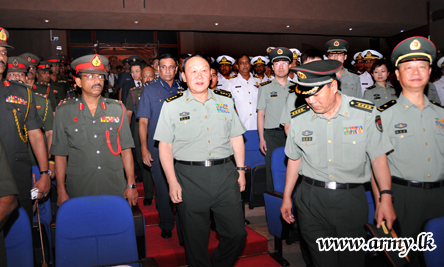 |
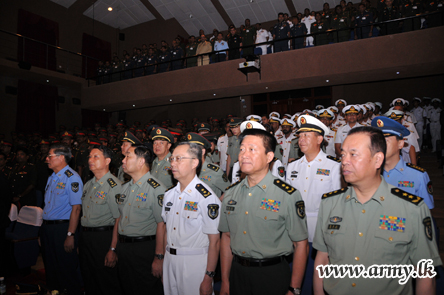 |
 |
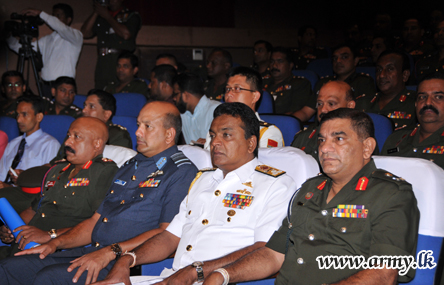 |
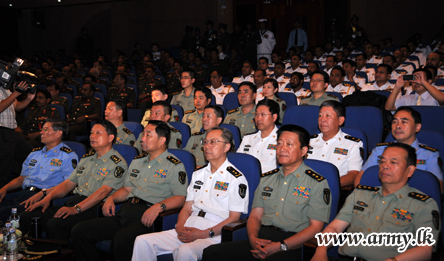 |
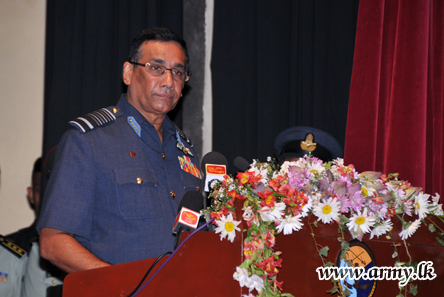 |
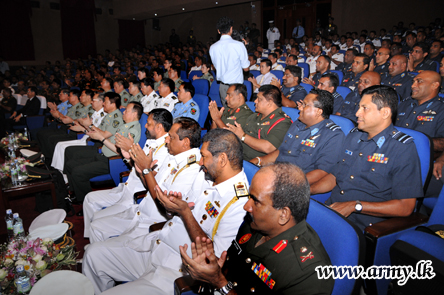 |
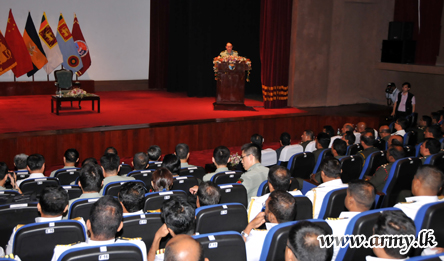 |
 |
 |
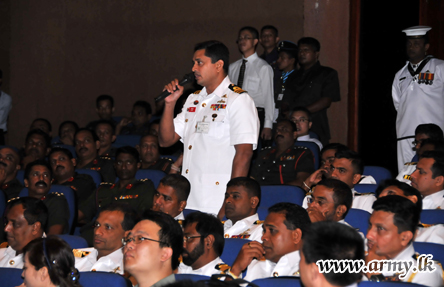 |
 |
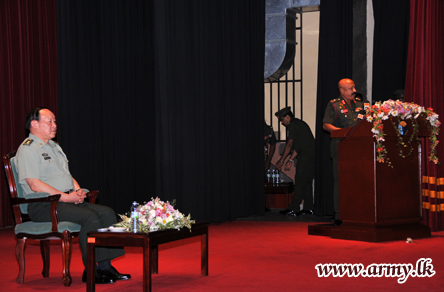 |
 |
 |
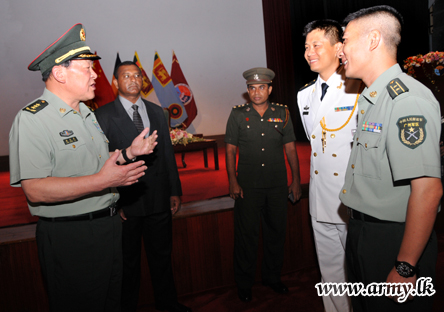 |
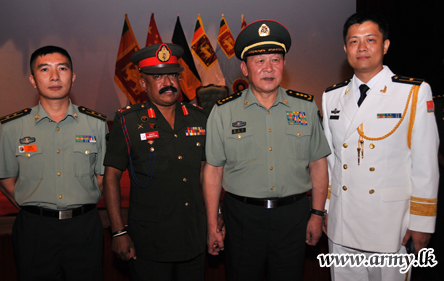 |
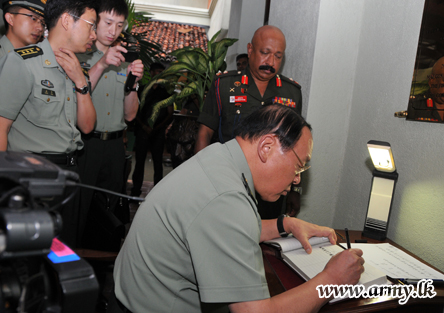 |
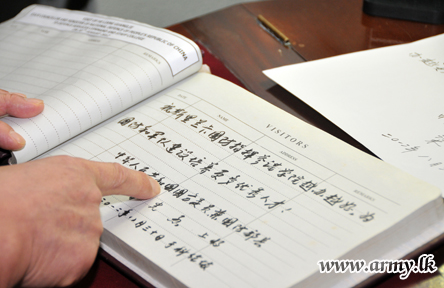 |
 |
